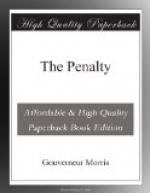“Oh,” she said, “I can’t—can you?”
“No,” he said almost angrily, “I can’t. And that’s the rotten side of money. That’s the stumbling-block for everybody who succeeds in collecting a lot of it. The distribution is infinitely harder than the collecting. I think we’d better pull up stakes, go back to New York, and think hard.”
“Yes. Let’s.”
“I’d like to have a talk with Blizzard.”
Barbara’s eyebrows went high with surprise.
“Why not? Your father writes that the man is doing more good right in New York City where it’s most needed than any six philanthropists the place ever owned. Maybe he’s got something really big in view, and maybe he’ll let us in on the ground floor.”
“Well,” said Barbara, “considering everything, I shouldn’t care to have much to do with him.”
Wilmot put back his head and laughed aloud. “That,” said he, “is precisely the sort of advice that I used to give you.”
Barbara blushed. “I’d like to forget that such a man ever came into my life in any way.”
“You can’t forget it, dear. You asked him in. You would do it. And now you can never forget. And that’s one of the penalties you have to pay for going against the people who love you most.”
“Well,” said she, “I’m willing to keep on paying—if the right people will keep on loving. Anyway, philanthropy—good works—are none of my business. My business, sir, is to make you a home. And with the exception of one person that I know about positively, the rest of the world can go hang.”
[Illustration: “And when you think,” said she, “that some women spend the best years of their lives making statues!”]
“That statement,” said Wilmot, “sounds very pagan and profane to me and also very, very beautiful. But, who, may I ask, is this other person?” His brows gathered a little jealously.
“This other person,” said Barbara quietly, “is at the present moment a total stranger to us,”
Then she leaned forward until her head was on his breast. And she gave a little sigh which was fifty per cent comfort, and fifty per cent courage. She could hear his heart beating like a trip-hammer. Had he burst into immortal eloquence, his words would have been of less consequence in her ear.
“And when you think,” said she, “that some women spend the best years of their lives making statues!”



